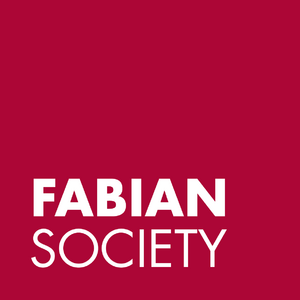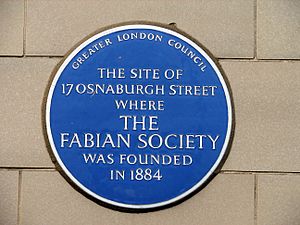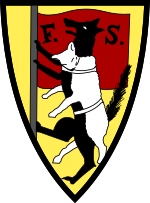Fabian Society facts for kids
 |
|
| Formation | 4 January 1884 |
|---|---|
| Legal status | Unincorporated membership association |
| Purpose | "To promote greater equality of power, wealth and opportunity; the value of collective action and public service; an accountable, tolerant and active democracy; citizenship, liberty and human rights; sustainable development; and multilateral international cooperation" |
| Headquarters | London, England |
|
Membership
|
8,000 |
|
Official language
|
English |
|
General Secretary
|
Joe Dromey, son of Jack |
|
Chair
|
Sonia Adesara |
|
Vice-Chairs
|
Luke John Davies |
|
Treasurer
|
Paul Richards |
|
Main organ
|
Executive Committee |
| Subsidiaries | Young Fabians, Fabian Women's Network, Scottish Fabians, around 60 local Fabian Societies |
| Affiliations | Labour Party, Foundation for European Progressive Studies |
The Fabian Society is a British group that believes in a type of socialism called social democracy. This means they want to improve society through slow, steady changes within a democracy, rather than through sudden revolutions. They have greatly influenced British politics.
The Fabian Society helped create the Labour Party in 1900. Many important political leaders, even from other countries like Jawaharlal Nehru of India, have been influenced by Fabian ideas. The Society also started the famous London School of Economics in 1895.
Today, the Fabian Society works as a think tank. A think tank is a group that does research and suggests ideas for government policies. It is connected to the Labour Party. Similar groups exist in Australia, Canada, New Zealand, and Italy.
Contents
History of the Fabian Society
How it Started

The Fabian Society began on January 4, 1884, in London. It grew out of an earlier group called The Fellowship of the New Life. Members of that group wanted to change society by living simple, good lives. Some of them also wanted to get involved in politics to help make changes. So, they formed the Fabian Society.
The Fabian Society was named by Frank Podmore. He suggested naming it after a Roman general named Quintus Fabius Maximus Verrucosus. This general was known as "Fabius the Delayer." He won battles by being patient and slowly wearing down his enemies, rather than fighting big, risky battles.
The Society's first leaflet explained this idea: "For the right moment you must wait, as Fabius did most patiently... but when the time comes you must strike hard." This meant they believed in making changes slowly and carefully, but then acting strongly when the time was right.
The Fabian Society's first symbol was a tortoise. This showed their belief in slow, steady progress towards socialism. They also had a symbol of a "wolf in sheep's clothing." This represented their method of achieving their goals. However, they later stopped using the wolf symbol because it had a negative meaning.
Nine people founded the Society. They included Frank Podmore, Edward R. Pease, William Clarke, Hubert Bland, Percival Chubb, Frederick Keddell, H. H. Champion, Edith Nesbit, and Rosamund Dale Owen.
Growing the Organisation
Soon after it started, the Fabian Society attracted many famous people. These included writers like George Bernard Shaw and H. G. Wells. Other important members were Annie Besant, Graham Wallas, and Emmeline Pankhurst.
Sidney and Beatrice Webb were very important to the Fabian Society. They wrote many studies about Britain's industries. They also suggested new ways for people to own businesses and land together.
Many Fabians helped create the Labour Representation Committee in 1900. This group later became the Labour Party. The Fabian Society's ideas were a big part of how the Labour Party was formed.
Between 1903 and 1908, more people became interested in socialist ideas in Britain. The Fabian Society grew a lot during this time. Its membership nearly tripled to almost 2,500 people.
Early Fabian Ideas
The Fabian Society wanted to improve society in many ways. They pushed for a minimum wage in 1906. This is the lowest amount of money an employer can pay workers. They also wanted a universal health care system in 1911. This would mean everyone could get medical care.
Fabians also wanted to change the British Empire. They believed Britain should use its power to help other countries. They supported a type of welfare state. This is where the government helps its citizens with things like healthcare and education.
They believed in a national education system. They thought good schools would help Britain's future. They also wanted to make sure British industries were efficient.
The Fabians also thought that money made from land rent was unfair. They believed this money should be used for the public good. This idea came from the economist Henry George.
Second Generation of Fabians
Between the two World Wars, a "Second Generation" of Fabians continued to be important. These included writers like R. H. Tawney, G. D. Cole, and Harold Laski. They kept influencing socialist ideas.
Many future leaders from countries that were once colonies learned about Fabian ideas. For example, Jawaharlal Nehru of India used Fabian socialism to shape India's economy after it became independent. This meant the government controlled major industries like steel and transportation.
Obafemi Awolowo from Nigeria was also a Fabian member. He used Fabian ideas to successfully run the Western Region of Nigeria. Lee Kuan Yew, the first prime minister of Singapore, was also influenced by the Fabians. However, he later felt that some of their ideas were not practical.
In the Middle East, Fabian ideas inspired the Ba'athist movement. This led to states controlling major industries and aiming to provide a basic standard of living for everyone.
In 1940, the Fabian Society created the Fabian Colonial Bureau. This group researched and discussed British colonial policy. It had a big impact on the policies of the Attlee government (1945–51).
The Fabian Society in the 20th Century
Throughout the 20th century, the Fabian Society remained important to the Labour Party. Many famous Labour politicians were members. These included Ramsay MacDonald, Clement Attlee, Tony Blair, and Gordon Brown.
In the 1990s, Ben Pimlott was the chairman. A writing prize is now held in his memory. The Society is connected to the Labour Party as a "socialist society."
The Young Fabians group was started in 1960. It is for younger Labour Party activists (under 31). It helps them network and discuss ideas. There is also an active Fabian Women's Network and groups in Scotland and Wales.
Influence on Labour Government
When the Labour Party won the election in 1997, the Fabian Society became a place for new ideas. One important Fabian idea was for the Bank of England to be independent. This means the government would not directly control it. This idea was suggested by Ed Balls in 1992. It became a major policy change after Labour took office.
Fabianism Today
In 2009, the Fabian Society had over 6,200 members. This was the highest number in 35 years. It was more than double the membership when Clement Attlee left office in 1951. By 2019, it had over 7,100 members.
Four Fabians, Beatrice and Sidney Webb, Graham Wallas, and George Bernard Shaw, founded the London School of Economics. They used money left to the Fabian Society by Henry Hutchinson. A special window designed by Shaw shows the founders. This window was stolen in 1978 but was found and returned in 2005.
The Fabian Society's Tax Commission in 2000 influenced the Labour government's policy. They suggested raising National Insurance to get more money for the National Health Service. This idea was largely adopted.
In 2017, a Fabian report suggested that Labour might need to work with other parties to win elections. This report predicted Labour would win fewer seats than they actually did in the 2017 election.
Fabianism Outside the United Kingdom
Fabianism has influenced socialist movements around the world. It has been a major inspiration for social democracy internationally.
In 1895, an American Fabian Society was started in Boston. It published a newspaper and pamphlets. Similar groups also appeared in Canada, Australia, and New Zealand.
Fabian ideas also influenced groups in Italy, like the Action Party. The Community Movement, created by Adriano Olivetti, was the only Italian party that directly mentioned Fabianism as an inspiration. In 2000, a Sicilian Fabian Society was founded in Messina.
How the Fabian Society Works
The Fabian Society's rules state that it does not have official policies. All its publications say that they are only the views of the authors. They do not represent the views of the whole Society.
Executive Committee
The Fabian Society is run by an elected executive committee. This committee has members elected from across the country. It also includes representatives from the Young Fabians, Fabian Women's Network, and Scottish and Welsh Fabians. Elections happen every two years. The committee meets four times a year and chooses a chair.
Secretariat
The Fabian Society has employees who work in its London office. This team is led by a general secretary, who is the CEO. The staff work in different areas like research, editing, events, and operations.
Fabian Review
The Fabian Society publishes a magazine called Fabian Review. It comes out four times a year.
Young Fabians
Since 1960, members under 31 years old can also join the Young Fabians. This group has its own elected leaders and smaller groups. The Young Fabians organize activities like policy discussions, social events, and publish pamphlets. They have special interest groups called Networks for topics like Economy & Finance, Health, and Education. They also publish their own magazine called Anticipations.
In 2023, the Young Fabians paused their in-person activities for a review. In 2024, they relaunched with some changes. People under 18 are no longer allowed to join, and the upper age limit was changed to 27. The Young Fabians are now led by two co-chairs.
Fabian Women's Network
All female members of the Fabian Society are also part of the Fabian Women's Network. This group has its own elected leaders. It organizes events and works to help more women get involved in politics. They have a special mentoring program. The Network also publishes a magazine called Fabiana.
Local Fabians
There are 45 local Fabian societies across the UK. These groups bring Fabian discussions to communities. Some, like those in Bournemouth and Oxford, have been around since the 1890s. Many local societies are connected to their local Labour Party groups.
Influence on Other Political Groups
When the Fabian Society started in 1884, there was no strong left-wing party. So, they first tried to influence the Liberal Party. They had some success with this. When the Labour Party was formed in 1900, their tactics changed.
More recent studies have looked at their impact on the Conservative Party. For example, Ashridge College was founded in the 1930s to create Conservative Fabians.
Criticisms of the Fabians
The Fabian Society is one of the oldest think tanks. It has sometimes been criticized, often by other left-wing groups.
H. G. Wells was a member but criticized the Society. He said it was just a "middle-class talking shop." He even made fun of the group in his 1910 novel The New Machiavelli.
Some critics from the early 1900s, like Vladimir Lenin, called the Fabians "social-chauvinists." They believed the Fabians were too focused on their own country and not revolutionary enough.
More recently, some have criticized the early Fabians for their views on certain social policies. Others, like Thomas Sowell, have said that Fabians represent an "elitist managerial class." They believe Fabians favor rule by experts over regular democracy.
Funding
The Fabian Society is considered "broadly transparent" about its funding. In November 2022, a website called Who Funds You? gave the Fabian Society an "A" grade. This is the highest rating for how open they are about their money.
See also
- Ethical movement
- Keir Hardie
- Labour Research Department
- List of Fabian Tracts to 1915
- List of think tanks in the United Kingdom
- New Statesman
- The New Age
 | William Lucy |
 | Charles Hayes |
 | Cleveland Robinson |


